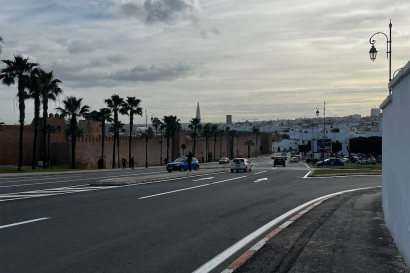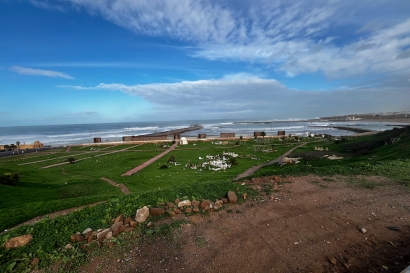Here is a question I’ve been asked countless times by friends, family, and total strangers, from the minute I touched down in Tangier continuing through yesterday, as I ate gnocchi in Florence, Italy: What is it like to live as a woman, a foreign woman and, what’s more, an American woman, in Morocco?
It’s an understandable question, of course, and one to which I dedicated a few Google searches before I bought my flight here. It’s been tackled in other thoughtful blog posts, I’m sure. But it’s also a leading question, which is why I’m responding to it. It assumes some yawning breach between the societies and cultures of Morocco and the U.S. It assumes I’ve accumulated horror tales of oppression or harassment.
Which I have, to a degree. Men have followed and catcalled and mocked me on the streets of Rabat and in the markets of Fez. I feel like a spectacle if I go for a run. It’s unacceptable behavior that, undeniably, has weighed on my time here.
But you know where I’ve also experienced catcalling? Walking through Washington, D.C.’s ritziest neighborhoods. At the central bus station in Milan. On a ranch in rural Panama. While swimming in the Dead Sea.
Catcalling is a global problem that occurs with varying degrees of severity in different places. Its prevalence in Morocco is problematic and certainly merits attention. But it’s also not fully representative of my experience here—just like it was not representative of my life in DC or in Panama. I don’t want to treat it as such.
Last week, I took a train alone to Asilah, which is this exquisite beach town up in northern Morocco, near Tangier. All its pearly whitewashed walls are plastered with art and draped with tapestries. The tides strew fragments of colorful zellige tile on the beach. It’s an utter dream.
On the ride there, the man beside me struck up a conversation. He was, it turns out, a philosophy professor, traveling back to Tangier from the teachers protests that are happening at present in Rabat—a separate but fascinating story if you have the time to look into it. He griped to me about typical Moroccan philosophers (too Islamic and anti-Nietzsche for him) and pestered me only about whether I supported a Marxist revolution (I do not).
Where does this fit into that question?
Or consider: After arriving at the Asilah train station, still alone, an excitable young taxi driver beckoned me to his taxi, which was blaring French trap music so loud the windows were trembling. He was thrilled to practice his English and even more thrilled to laugh at my faltering Arabic. When we pulled up to town, he showed me pictures of his Belgian girlfriend and didn’t charge me for the ride.
These interactions don’t fit easily into any narrative. That’s why my answer to that question—what is it like—is: Being a foreign woman in Morocco means a lot of different things, most of which I don’t fully understand after just two months in Rabat.
So I have no easy answers to questions about gender in Morocco. I do know, though, who to turn to. I’ve met many, manyMoroccan women (from journalists to professors to service workers) here that have overcome immeasurable challenges in their professional and personal lives, and discuss issues of gender, sexism, and the patriarchy eloquently and openly. Want to know what it’s like to be a woman in Morocco? I’ll happily defer to them.

Katya Schwenk
I'm at junior at Georgetown, studying government, creative writing, and Arabic. I grew up in Vermont and Massachusetts. Interests include (but are not limited to!) radio, poetry, hiking, and beekeeping.








